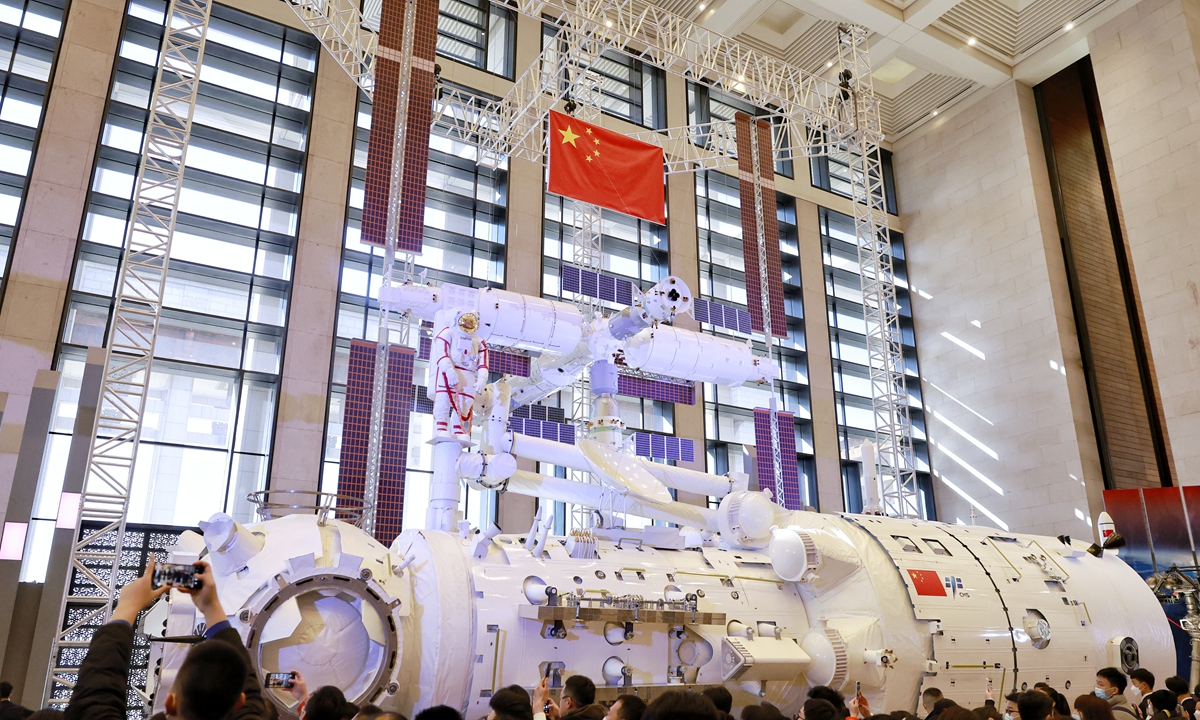
Visitors take photos of the 1:1 scale model of the Tianhe core module of China's space station on February 24, 2023. Photos: Li Hao/GT
China should expand its friend circle in space science and relevant cooperation, while taking the lead in major space science projects internationally so as to significantly increase China's influence in the exploration and use of outer space, Wang Chi, a National People's Congress deputy and research fellow at the Chinese Academy of Sciences (CAS), said during the ongoing two sessions, media reported on Friday.
"Initiating and leading international scientific programs will not only promote the high-quality development of China's research, but will also play a key role in solving common human development problems, and be effective in maintaining China's scientific and technological security," Wang said, according to China Science Daily.
Space science could be a major breakthrough for frontier scientific studies, and even give rise to a new round of scientific revolutions, the deputy said. "Under the current circumstances at home and abroad, there is an urgent need for a breakthrough in the field of space science, which requires closer collaboration and more convenient cooperation approaches," he noted.
Wang put forward the idea that China should deepen cooperation with the European Space Agency (ESA) as well as other space organizations. Through a number of communication mechanisms, the two sides should maintain high-quality and frequent dialogues.
Wang also suggested that departments in charge of international collaboration optimize and simplify procedures to smoothen communication channels and facilitate the exchange of funds, equipment and personnel.
China and ESA are currently collaborating on a joint space science mission, the Solar Wind Magnetosphere Ionosphere Link Explorer, or SMILE. It is designed to build a deeper understanding of the Sun-Earth connection by observing the dynamic interaction between the solar wind and Earth's magnetosphere.
The mission is expected to be launched in April 2025, following a number of delays due to "technical difficulties and programmatic evolutions, among which a significant impact was due to COVID," according to David Agnolon, SMILE project manager, SpaceNews reported. It was originally intended for launch in 2021.
In February, ESA Director General Josef Aschbacher revealed that the agency will not send astronauts to China's Tiangong space station, noting that "for the moment we have neither the budgetary nor the political… green light or intention to engage in a second space station; that is, participating on the Chinese space station," the Space News reported.
Song Zhongping, a space watcher and TV commentator, told the Global Times on Friday that China and ESA have great potential in various fields, including space science and deep-space collaboration on the Moon and Mars. However, due to differences in ideologies and values and strong pressure from the US, they have hit pause on their collaboration with China.
"From joint research and development of the lunar surface to joint creation of the space station…the prospects are very broad, but the premise is to abandon the differences in politics, and to strengthen mutual trust in science and technology," Song said.




